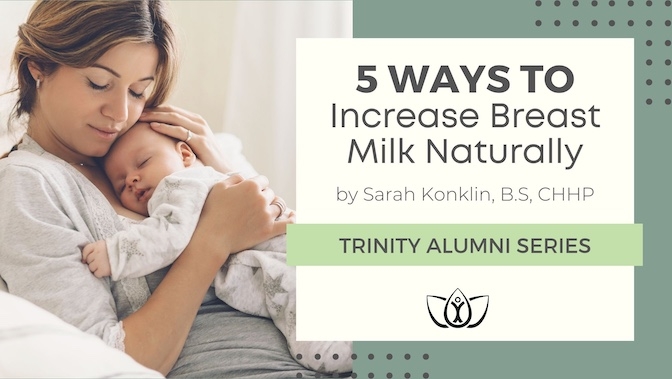 Have you ever been frustrated in the middle of the night trying to breastfeed your crying baby, but they are not showing signs of any satiation? You’re tired and disappointed, you feel like a failure as a mother, and all you want is to provide for your hungry baby. You try, and you try, but nothing seems to be filling them up. Sound familiar?
Have you ever been frustrated in the middle of the night trying to breastfeed your crying baby, but they are not showing signs of any satiation? You’re tired and disappointed, you feel like a failure as a mother, and all you want is to provide for your hungry baby. You try, and you try, but nothing seems to be filling them up. Sound familiar?Many mothers might consider switching to formula; after all, your baby needs to eat. Before it’s necessary to start down the formula route, it is important to know that there are several natural ways to increase your breast milk. Let's explore some of these methods.
5 Ways to Increase Breast Milk Naturally
1. Frequent Nursing
The more you can nurse your baby, the more this will stimulate milk production. Prolactin, a hormone produced by the pituitary gland, is responsible for the secretion of milk in the breast. When a baby suckles, prolactin levels increase in the mother’s blood, therefore, increasing milk production.Using a breast pump can also stimulate more milk letdown. If using a pump, you can then
transfer the milk to a bottle, but be sure to use a bottle with a nipple that most resembles the breast so as not to confuse your baby with multiple shapes to feed from. The breast pump will also give you an idea of how much milk you are producing. Even if it means feeding or pumping every hour, this action can ultimately increase milk supply and, in turn, help provide the necessary calories and nutrients your baby needs.
2. Increase Hydration & Nutrient Dense Foods
Milk production requires a vast amount of hydration and foods packed with vitamins and minerals. Although you may feel like eating sweets and potato chips for a quick burst of energy, these foods can rob you of the vital nutrients needed to create breast milk. There is a common misnomer that nutrition and hydration do not affect breast milk. This is simply not true. The consequences of neglecting proper nutrition, specifically in the first few months of delivery, can have lasting effects into the menopausal years and after.Nourishing foods with a positive effect on breastfeeding and satiation for your baby include organ meats, pasteurized meats from local sources, raw milk, cod liver oil, grass-fed butter, eggs rich in choline, fresh seafood, lacto-fermented foods, bone broth, and fresh fruits and vegetables.
Breast milk is the only source of hydration for your baby if you are exclusively breastfeeding. It is crucial to consume lots of pure water and hot herbal teas while breastfeeding. Breast milk is made up of about 87% water, 3.8% fat, 1% protein, and 7% lactose. Milk production requires adequate water to operate smoothly, so remember to drink up every time you feed to help maintain production.
3. Eat Lactogenic Foods
Lactogenic foods are high in beta-glucans, a soluble fiber found in the cell walls of algae, bacteria, yeast, fungi, and some plants such as oats and barley. Beta-glucans are known to benefit many physiological systems in the body. But, most noteworthy, they can aid in the synthesis and release of prolactin.Oats are probably the most well-known food that helps increase breastmilk supply. Following barley, oats have a higher concentration of beta-glucans than any other known food. There are many ways to consume oats - oatmeal, muffins, protein-packed lactation cookies - just to name a few. Additionally, there are many ways to consume barley, and it has even more beta-glucans than oats. You can add it to soups, stews, and salads or use barley flakes in milk or homemade breads.

4. Utilize Galactagogues
Another way to increase breast milk naturally, which has been used for hundreds of years, is by consuming substances that act as galactagogues. The word “galactagogue” comes from the Greek words “milk” and “leading.” Most galactagogues are herbs, with fenugreek being the most common. Fenugreek is one of the most helpful herbs for increasing breast milk. It can be consumed by soaking the seeds in hot water and preparing it like tea.Blessed thistle and alfalfa can be taken in capsule or herbal form and work best in combination with fenugreek. Another powerful galactagenic herb is Goat’s Rue. This herb is also best when combined with fenugreek, but caution should be exhibited when using it as the fresh leaves are considered toxic. Make sure to buy this herb from commercially prepared dried leaves or capsules.
Additionally, pharmaceutical galactagogues are available for use by medical
prescription. These include domperidone, a dopamine antagonist, and metoclopramide.
5. Ensure the Breast is Completely Drained
It may sound obvious, but it bears to be stated: when finishing a feed, ensure the breast is completely drained (it will never be fully without milk, but it will merely feel empty). This will help speed up production, inevitably increasing your milk supply. A protein in milk called “Feedback Inhibitor of Lactation” (FIL) builds up and begins to slow down milk production. Because of this protein, breasts that are full of milk will make milk more slowly and eventually not at all. Therefore, to maximize milk production, it is important to feed when the breasts are not at their fullest, as this will reduce milk production over time.update
Rather than waiting for your baby to cry when they are hungry, offer a feed when your breasts are not full and your baby is not completely hungry. This will help stimulate more milk production in the long run.
Conclusion
If you are struggling with your milk supply, please know you are not alone, and you have options to try before supplementing with formula. Remember to nurse frequently, even before your baby cues you into their hunger, eat a diet full of nutrient-dense food, consume plenty of water, eat lactogenic foods, incorporate galactagogues, and ensure your breast is fully drained at each feed.References:
1. DiNicolantonio, J. (2016, Aug 16). Added sugars drive nutrient and energy deficit in
obesity: a new paradigm. Retrieved on 6/29/24 from: https://www.ncbi.nlm.nih.gov/pmc/articles/PMC4975866/.
2. Sepehri, H. (2007). THE EFFECT OF β-GLUCAN ON PROLACTIN SECRETION IN
GH3/B6 CELLS. Retrieved on 6/29/24 from: https://www.sid.ir/fileserver/je/10012007a301.pdf
3. Ferranti-Ballem, L. (2024, June 10). How to Increase Breast Milk Supply: 7 Foods to Eat.
Retrieved on 6/29/24 from: https://www.todaysparent.com/baby/breastfeeding/foods-to-increase-breast-milk/.
4. Patel, S. (2018, Sep 4). How can I use fenugreek to increase my breast milk supply?
Retrieved on 6/25/24 from: https://utswmed.org/medblog/fenugreek-breast-milk-supply/.
5. N.a. (n.d.). Boosting Your Breast Milk Supply With Galactagogues. Retrieved on 6/26/24
from: https://americanpregnancy.org/healthy-pregnancy/breastfeeding/galactagogues-boosting
-your-milk-supply/.
6. Fallon Morell, S. (2015). The Nourishing Traditions Book of Baby & Child Care.
7. Joyce, J. (2021, Feb). Retrieved on 7/1/24 from: https://laleche.org.uk/how-milk-production-works/#:~:text=As%20milk%20builds%20up%20in,this%20will%20reduce%20milk%20production.
8. Grafiada, J. (2019, Feb 1). Nourishing the New Mother: The Lost Art of Postpartum
Care. Retrieved on 7/1/24 from: https://www.westonaprice.org/health-topics/womens-health/nourishing-the-new-mother-t
he-lost-art-of-postpartum-care/#gsc.tab=0.
About the Author
 Sarah Konklin, B.S, CHHP, has a lifelong passion for guiding others on their health and wellness journeys. As a new mom, balancing the joys and responsibilities of motherhood, Sarah has developed a holistic approach to health that considers the well-being of the mind, body, and spirit.
Sarah Konklin, B.S, CHHP, has a lifelong passion for guiding others on their health and wellness journeys. As a new mom, balancing the joys and responsibilities of motherhood, Sarah has developed a holistic approach to health that considers the well-being of the mind, body, and spirit.
In addition to her work in health, she is also a co-owner of a thriving coffee catering company that she runs alongside her husband. This venture reflects her entrepreneurial spirit and her love for creating experiences that bring people together.
Driven by a mission to empower others, her ultimate aspiration is to open her own practice where she can fully dedicate herself to helping individuals achieve balance and wellness in their lives. Through her journey as a mother, business owner, and health professional, she continues to explore new ways to grow and make a positive impact on the lives of those she encounters.

This article was reviewed by Lauren Ameling, DC, BCND. Dr. Lauren Ameling is a 2006 graduate of Logan University, where she earned a Doctor of Chiropractic and a Bachelor of Science in Human Biology. She is a chiropractic physician certified in acupuncture and naturopathy, specializing in traditional Chinese medicine, pregnancy and pediatric care, and kinesiology. Dr. Ameling has worked in healthcare education since 2010 and serves as the Chief Operating Officer of Trinity School of Natural Health.


